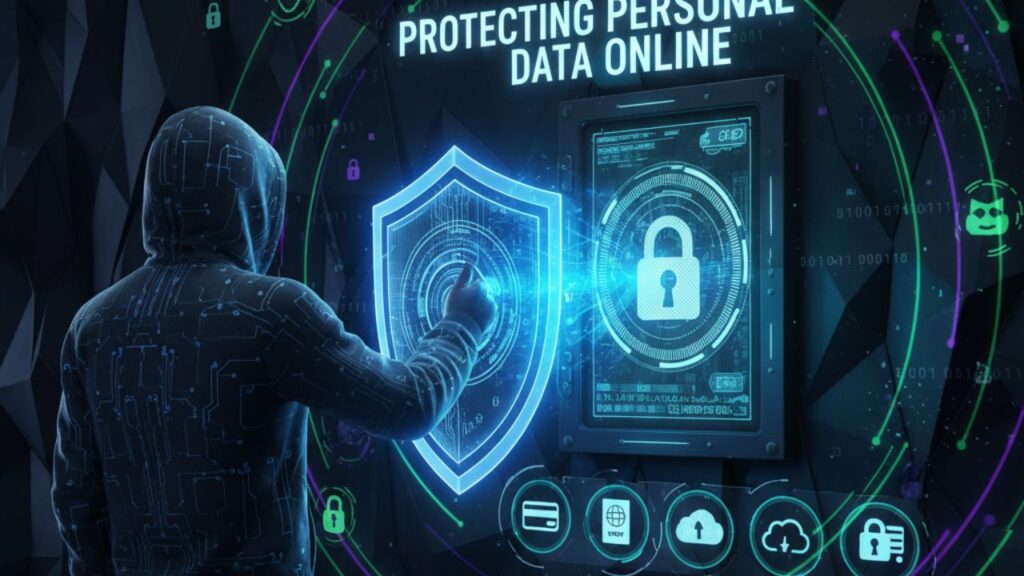Your personal data is valuable. Sadly, it often leaks onto the dark web. Billions of personal records get stolen each year. This includes names, addresses, and even bank details. The dark web is a hidden part of the internet. Special software like Tor is needed to access it. Your information can end up there after a data breach. It often sells to criminals.
This exposure creates big risks. You face identity theft. Someone might open credit cards in your name. Financial fraud is a real danger. Your money could disappear. There’s also reputational harm. Imagine your private messages appearing online. This article helps you fight back. We will show you how to remove your data. It is a tough job, but you can do it.
Understanding the Dark Web and Your Data
What is the Dark Web?
The dark web is like a secret part of the internet. It is not the regular web you use every day. Think of it as an iceberg. The part you see is the surface web. Search engines like Google find these sites. The deep web is below that. It contains things like your online banking or cloud storage. This content needs a password to get in. It is not indexed by search engines.
The dark web is the very bottom. It is completely hidden. Special tools are needed to get there. Tor browser is the most common one. People use it for many reasons. Some seek privacy. Others hide illegal acts. Your information often gets bought and sold there.
Why is Data There?
Your personal data ends up on the dark web for several reasons. One main way is through data breaches. A company you trust might get hacked. Hackers steal customer lists. These lists contain your name, email, and password. Sometimes, even credit card numbers are taken.
Phishing scams are another problem. You might click a bad link. This can install malware. Malware steals your info directly. Criminals also trade data illegally. Insiders at companies sometimes sell sensitive files. All these actions put your data at risk. Your details then appear on dark web forums or marketplaces.
Identifying Your Compromised Information
You cannot fix a problem you do not know about. Finding your leaked data is the first step. You need to know what specific info is out there. This helps you protect it. What part of your identity is exposed? Is it your email? Your Social Security number? Your credit card? Knowing this guides your next steps.
Several tools help you discover this. Dark web monitoring services are very helpful. They scan hidden parts of the internet. They look for your personal details. These services often track email addresses, phone numbers, and bank details. Some might cost money. Many credit bureaus or identity theft protection plans include this service.
You also get alerts from services you use. Your email provider might tell you about a breach. A company you buy from could send an alert. Pay attention to these warnings. They are crucial clues.
A word of warning: you can try manual searching. This means using dark web search engines. This path is very risky. It is complex and dangerous. You can stumble upon harmful content. It is generally not advised for most people. Stick to trusted monitoring tools first.
Strategies for Removing Your Data
The Direct Removal Approach (When Possible)
Sometimes, you might find your data on a specific site. This is rare on the dark web. If you do, direct action is a first step.
Also Read: What is the Dark Web? A Comprehensive Guide
Contacting Website Administrators
Imagine you find your email on a dark web forum. If you can identify the administrator, contact them. This is often hard. Dark websites value anonymity. They do not usually have clear contact info. If you find an admin, ask them to remove your data.
Show proof that the data belongs to you. Explain why it should be taken down. The chances of success are often low. Many dark websites are not legal. They do not follow rules. But it is worth a try if you can find them.
Legal and Law Enforcement Involvement
Direct removal is often not an option. Your information might be spread widely. This is when you consider legal help. If you suffer a big financial loss, call a lawyer. They can guide you. Law enforcement also plays a role. Report serious issues like identity theft. In the US, you can file a report with the Federal Trade Commission (FTC). The FBI’s Internet Crime Complaint Center (IC3) also takes reports.
Do not expect police to remove dark web data. Their job is to catch criminals. They work to stop cybercrime. They rarely delete information from these hidden sites. But reporting helps them build cases. It can also create a paper trail for you. This helps with recovery if you face fraud.
Leveraging Data Removal Services
You can get help from professional services. These companies specialize in data cleanup. They know how to handle complex situations.
How Data Removal Services Work
These services act on your behalf. First, they scan the dark web. They pinpoint where your data is. Then, they contact data brokers. They ask these companies to delete your info. Data brokers collect and sell your data. These services also tackle public sites. They request removal from places that list your personal details.
The process is not instant. It takes time. They also monitor for re-listing. Your data might reappear after removal. These services aim to keep it off the web. They save you hours of work. It is like having an expert clean up your digital mess.
Choosing a Reputable Service
Not all data removal services are equal. Some make big promises they cannot keep. Look for companies that are open about their work. They should tell you how they operate. Check their pricing too. Avoid hidden fees. Read customer reviews. What do others say about their success? Do they have good feedback?
Understand what they can and cannot do. No service can guarantee 100% removal. This is simply not possible. Data spreads too fast online. Be wary of anyone who promises a full scrub. As cybersecurity expert Maria Gomez notes, “A good data removal service focuses on managing risk.
They remove accessible data. They educate you on staying safe. They do not promise miracles.” Pick a company focused on real solutions.
Some paid services, like Norton LifeLock, Aura, or IdentityForce, constantly monitor the dark web and alert you if your data reappears.
Proactive Measures and Prevention
Removing old data is important. Stopping new leaks is even better. Protect your info every day.
Strengthening Online Security Practices
Your online habits matter a lot. Use strong, unique passwords. Do not reuse them. A password manager can help you create and store these. Enable Two-Factor Authentication (2FA) wherever possible. This adds an extra layer of security. It makes it harder for hackers to get in.
Be very careful with emails and links. Phishing scams try to trick you. Do not click on unknown attachments. Watch for strange links. If something looks odd, it probably is. Check your accounts often. Look for any activity that is not yours.
Your bank account, email, and social media should be checked. Catching unusual activity early is key.
Limiting Publicly Available Information
Reduce your digital footprint. Think about what you share online. Go through your social media privacy settings. Limit who sees your posts. Do not share your home address or phone number publicly. Data brokers gather this info. They sell it. You can opt out of their databases. Search for “data broker opt-out” online. Many sites let you request removal. This makes it harder for your info to spread.
Credit Freezes and Fraud Alerts
These tools protect your money. A credit freeze stops new credit accounts. No one can open a loan in your name. This is true even if they have your Social Security number. Contact the three main credit bureaus: Experian, Equifax, and TransUnion. Place a freeze with each one. It is free to do.
A fraud alert is different. It warns lenders. It tells them to check your identity carefully. They should contact you before opening new accounts. A fraud alert is easier to set up. It lasts one year. A credit freeze is stronger. It stays in place until you lift it. Both help prevent financial fraud.
Challenges and Realistic Expectations
The Difficulty of Complete Removal
It is very hard to remove all your data from the dark web. Think of it like a ripple in water. Once data is out, it spreads. The dark web is anonymous. This makes it tough to find who runs sites. Many bad actors are across the world. Different countries have different laws.
It is hard to get them to comply. Data gets copied over and over. Many criminals share it. The sheer volume of data is huge. One leak can affect millions. Because of these reasons, a 100% clean slate is often not possible.
The Importance of Ongoing Monitoring
Removing data is not a one-time thing. You need to keep watching. Your info could pop up again. For instance, a removed email might appear on a different forum. This happens all the time. Companies have new breaches.
New data gets stolen. Continuous dark web monitoring is vital. Use a service or check yourself. Stay on top of your online security. Regularly update passwords. Use two-factor authentication. Always be careful about what you click. It is a constant battle. But you can win many small fights.
Conclusion
Your personal information on the dark web is a real problem. You can fight back. Start by understanding what the dark web is. Find out if your data is there. Use monitoring services for this. Consider direct removal if you can find the source. Professional data removal services can help a lot. Most importantly, practice good online habits.
Use strong passwords. Turn on two-factor authentication. Limit what you share. Freeze your credit if you are worried. Complete removal is tough. Still, you can greatly lower your risk. Stay alert. Keep protecting yourself.
Q&A
Q1: Can I personally remove my data from the dark web?
Generally, no. Once information is sold, it circulates across multiple platforms. However, you can minimize further damage by securing your accounts and working with identity protection services.
Q2: How do I know if my data is on the dark web?
You can use dark web scanning tools like Experian, Aura, or Norton that alert you if your email, passwords, or bank details are found.
Q3: Should I contact the police if my data is leaked?
Yes, especially if financial fraud or identity theft has occurred. In cases involving government IDs, also inform concerned authorities immediately.
Q4: Is it safe to use free dark web monitoring tools?
Yes, as long as you use trusted providers. Always avoid shady websites claiming to scan the dark web for free, as they may collect more of your data.
Q5: What is the fastest way to protect myself if my data is compromised?
Immediately change all passwords, enable MFA, and secure your financial accounts through alerts or freezes.

